Wake Forest University’s Sabin Center Hosts Groundbreaking Conference on Environmental Stewardship
Wake Forest University recently hosted a landmark event in environmental scholarship with the inaugural conference of the Andrew Sabin Family Center for Environment and Sustainability. From October 9-11, 2024, experts from around the globe gathered on the Reynolda Campus for “Advancing Stewardship: Innovative Approaches for a Thriving Planet.” The conference was a vivid display of Wake Forest’s commitment to fostering cross-disciplinary dialogue, innovation, collaboration, and bi-partisanship in the fight for environmental sustainability.
“Our intent was to bring together world-class thought leaders to disseminate innovative strategies for protecting and restoring areas vital to the world’s ecological health,” said Stan Meiburg, Executive Director of the Sabin Center. “Creative thinking and new approaches are essential to our goal of a world that is sustainable, just, and abundantly wild.”
Intentionally designed to engage both practitioners and the broader public, the conference brought together a diverse audience that included not only academics and students but also local citizens, community leaders, and private-sector professionals. This accessible format broadened the conversation and reinforced the importance of community inclusion in environmental stewardship.
“Our intent was to bring together world-class thought leaders to disseminate innovative strategies for protecting and restoring areas vital to the world’s ecological health. Creative thinking and new approaches are essential to our goal of a world that is sustainable, just, and abundantly wild.”
Stan Meiburg, Executive Director, Sabin Center
Each session demonstrated the complexity of environmental challenges and the importance of uniting diverse perspectives to develop holistic solutions. Central themes of the conference included conservation, climate resilience, public-private partnerships, and the critical role of education in driving environmental action.
A Global Perspective on Environmental Stewardship
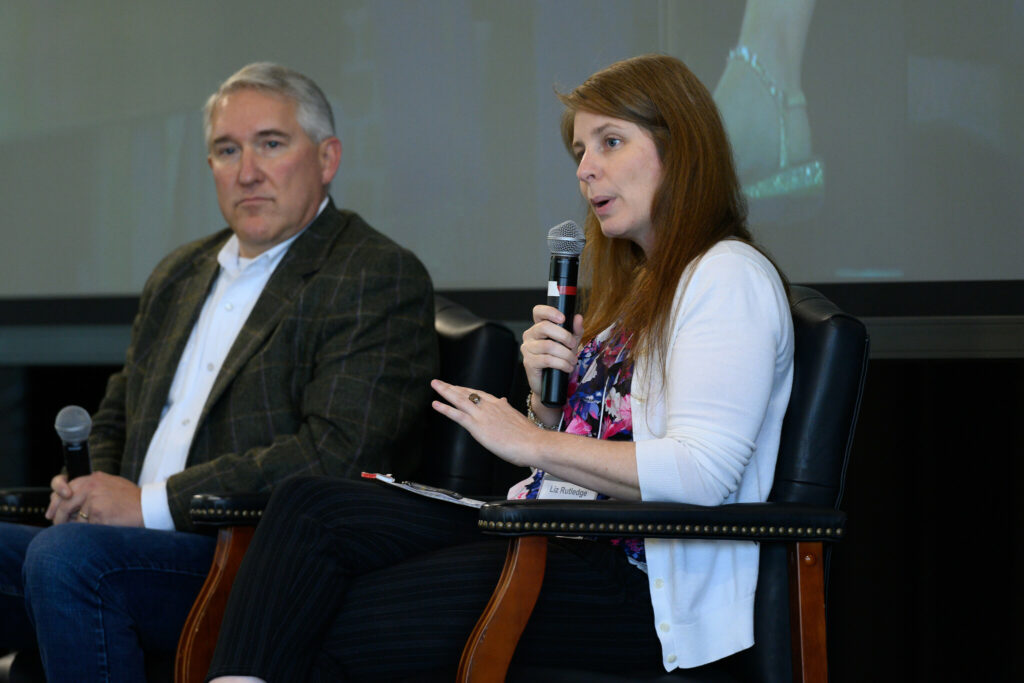
The conference kicked off with an important session titled, “When Working Lands Meet the Wild,” moderated by Wake Forest’s Miles Silman, the founding director of the Sabin Center, that explored human-wildlife coexistence, with a particular focus on the successes posed by wolf reintroduction programs. Panelists, including Dr. Liz Rutledge of the North Carolina Wildlife Federation and Brian Yablonski of the Property and Environment Research Center (PERC), shared their experiences balancing conservation with the needs of rural communities and private landowners. The reintroduction of wolves, from the red wolves in North Carolina to gray wolves in Yellowstone, sparked dialogue about innovative solutions, such as virtual fencing and compensation funds, designed to foster peaceful coexistence between humans and wildlife. This session exemplified the importance of collaboration, emphasizing that conservationists must work closely with private landowners and local communities to create sustainable solutions.
Building on the collaboration theme, in a session titled “Public-Private Partnerships,” Acting United States Deputy Secretary of the Interior Laura Daniel-Davis and Conservation Fund Senior Advisor Bill Holman underscored the value of public-private partnerships in environmental conservation. Moderated by Scott Schang, director of the Environmental Law and Policy Clinic at Wake Forest, the session delved into real-world examples of successful partnerships, such as the Klamath River Basin restoration and protection efforts for the red-cockaded woodpecker. Holman added insights on the role of nonprofit organizations in building trust with landowners, while Daniel-Davis emphasized the importance of bipartisan support and engaging underserved communities to build sustainable conservation models. Together, the panel illustrated the far-reaching impact of collective action across sectors.
A Unified Vision for Conservation
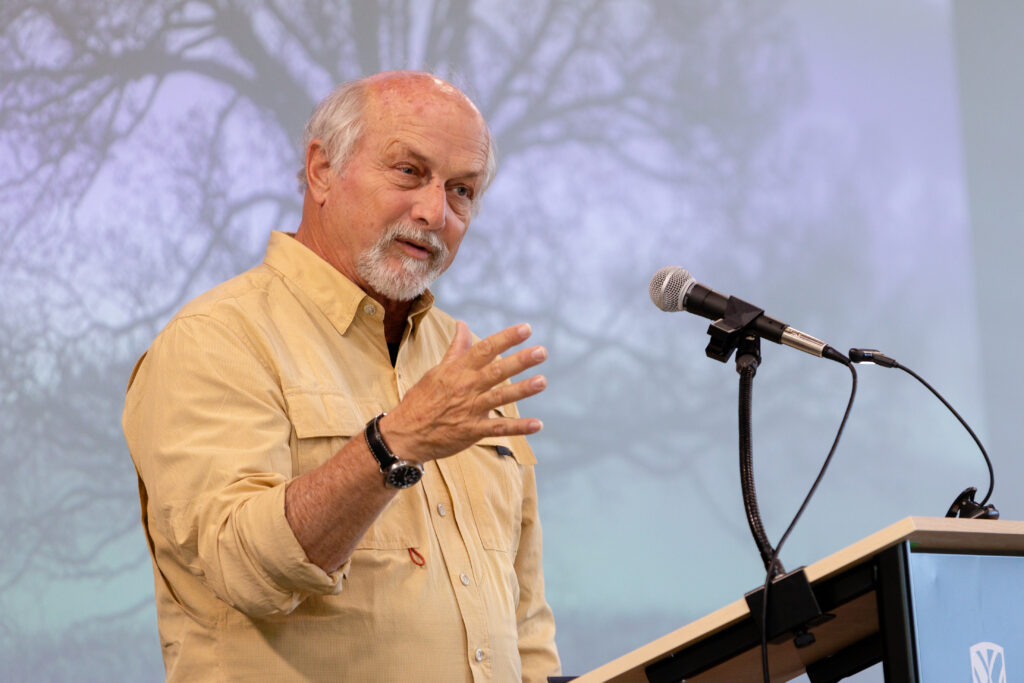
In a thought-provoking lunch session, Dr. Gary Machlis, University Professor of Environmental Sustainability at Clemson University, presented “A Unified Vision of Conservation.” Dr. Machlis offered a candid critique of the fragmentation in the conservation movement and advocated for a more integrated approach. He described conservation in America as “a mature tree with branches spread far apart,” highlighting the divisions among various conservation groups, from nature preservation organizations and historic preservationists to environmental justice advocates and health agencies. “A more unified vision of what constitutes conservation is vital for the future of the movement,” Machlis suggested, urging these groups to join forces.
Dr. Machlis proposed eight essential branches of conservation: preserving biodiversity, protecting historical structures, provisioning ecosystem services, ensuring environmental justice, advancing sustainable infrastructure, promoting health through environmental quality, driving scientific research, and engaging faith communities. He emphasized the need for regular communication and shared agendas across these branches to build new alliances and foster transformative change. Dr. Machlis also called on young people to lead the future of conservation. His vision provided a compelling roadmap for a more cohesive and resilient conservation movement, resonating with the audience’s aspirations for broader impact.
Innovation Meets Education
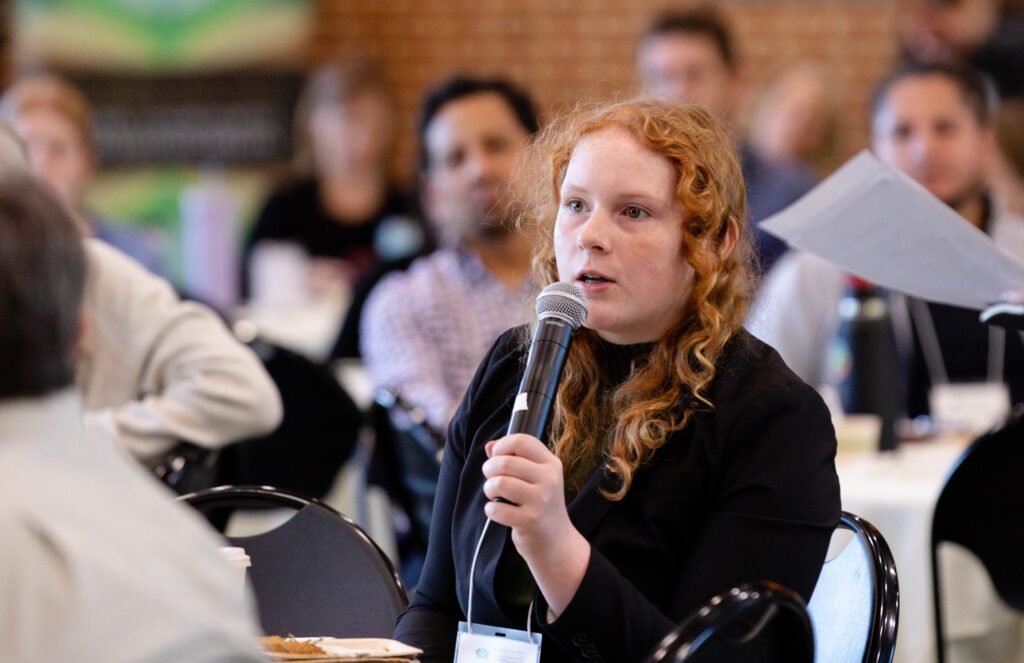
At the core of the conference was Wake Forest University’s dedication to education and the cultivation of future environmental leaders. One of the most remarkable aspects was the direct involvement of students in all sessions. From posing insightful questions to contributing their perspectives, students actively participated in shaping the conference discussions and benefitted from having a platform to engage with leading voices in environment, sustainability and conservation.
Jessica Parker, a senior environmental science major who participated in the conference shared,
“The panelists were extremely accessible to me as an undergrad. I was able to speak with several of them for a long time about their talks and it really deepened the experience.”
Pulitzer Prize-winning author Elizabeth Kolbert, who delivered the keynote address, extended her engagement beyond the main stage. Kolbert joined a combined session of two undergraduate classes—Professor Lisa Sorg’s Environmental Journalism and Dr. Rowie Kirby-Straker’s first-year seminar called “Greta Thunbergs Everywhere: Caribbean & Pacific Island Youth in Environmental Communication”—where she interacted with students, sharing her expertise on environmental journalism and offering perspectives on the stark realities of climate change. Kolbert also met with undergraduate and graduate biology students and created an intimate setting for them to discuss their environmental studies and career aspirations.
Dr. Kirby-Straker described the impact Kolbert’s visit had on her students’ learning experience: “In our class, we discuss perspectives of both academic researchers and practitioners on the frontline of environmental work and ask questions that remain unanswered by course material. Being able to read Elizabeth Kolbert’s work and also ask her some of these unanswered questions in-person was a rare opportunity for the students, made even more special by her Pulitzer Prize winning frontline work in Environmental Journalism. Additionally, seeing Eilzabeth Kolbert interact with Prof. Lisa Sorg and her environmental journalism students and hearing Kolbert’s responses to their questions made for a very rich learning experience.”
The engagement with Kolbert made a lasting impression on Christina Nestor, a first-year student in Dr. Kirby-Straker’s seminar: “After reading Elizabeth Kolbert’s book, H Is For Hope: Climate Change from A to Z and listening to her during our class conversation, I gained essential insights into the importance of maintaining hope for change while also recognizing the extremities of the environmental issues our world faces. Elizabeth shared with our class her knowledge about the unnerving problems we are facing, while also providing feedback on what we can do as adults to help contribute to making a difference for the greater good of our community.”
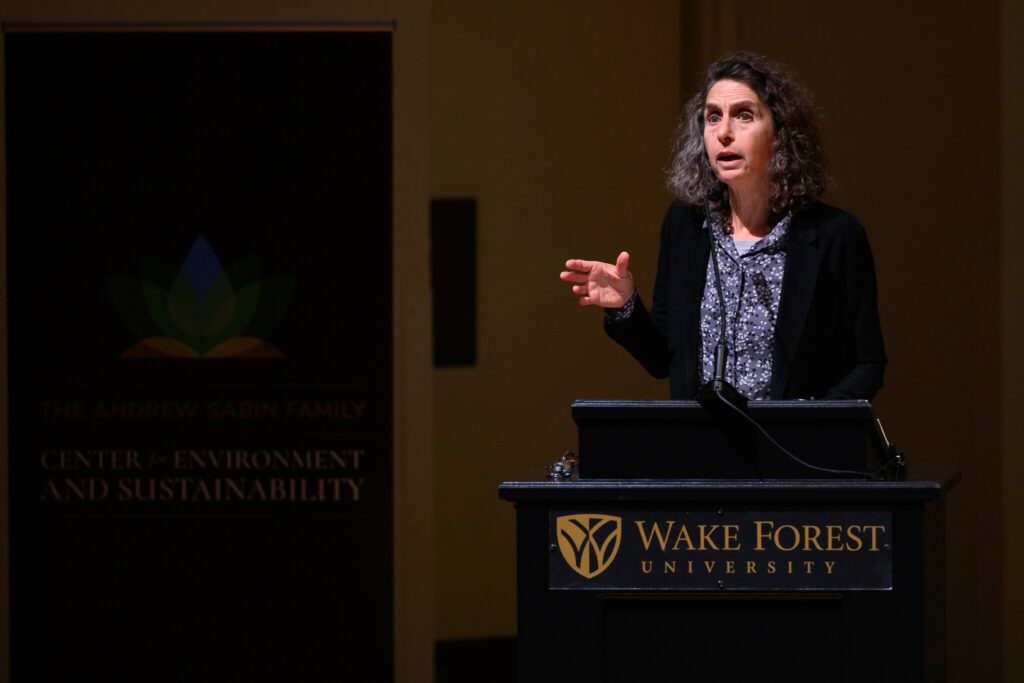
Kolbert’s keynote, “The Fate of the Earth,” delivered a sobering yet inspiring message about the future of the planet. Known for her incisive reporting on climate change, Kolbert reflected on the unintended consequences of human actions and the urgent need for innovative solutions. Her stories—from the introduction of cane toads in Australia to the ongoing efforts to prevent invasive species from entering the Great Lakes—highlighted the complexities of environmental management. Her address left attendees with a sense of cautious optimism, emphasizing the human capacity for ingenuity and resilience on behalf of the survival of the planet.
Tropical Frontiers
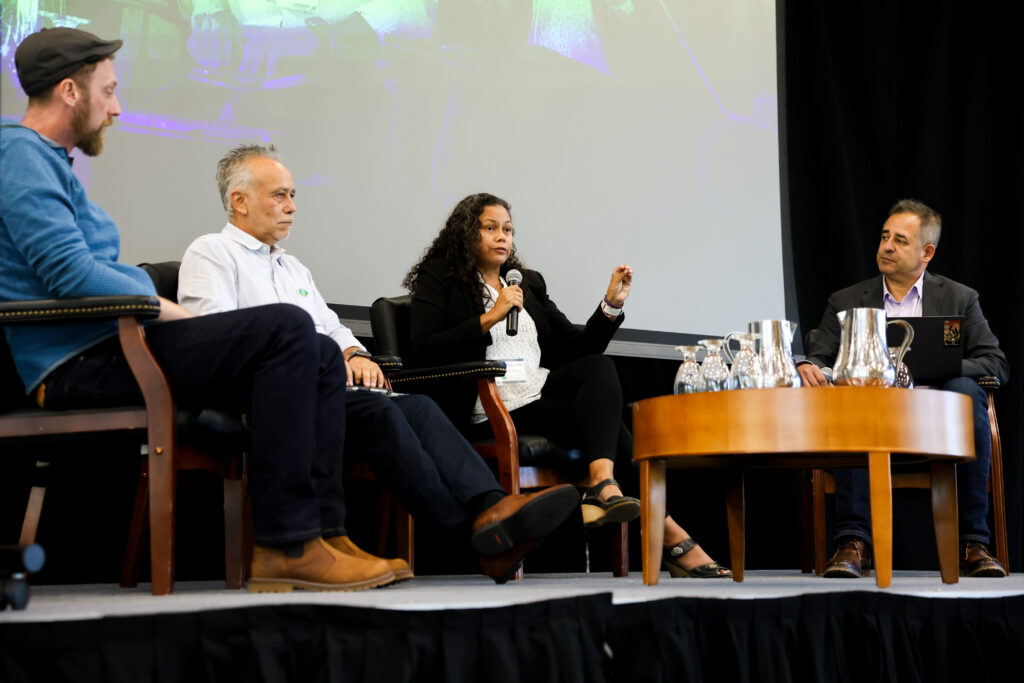
The session, “Transformative Approaches to Stewardship: Capacity, Community, and Collaboration Across Our World,” brought together leaders whose work focuses on tropical regions, each presenting groundbreaking conservation efforts in these critical ecosystems. Panelists Enrique Ortiz of the Andes Amazon Fund, Julie Robinson from The Nature Conservancy in Belize, and Andrew Whitworth of OSA Conservation in Costa Rica discussed strategies for addressing complex conservation challenges. Robinson highlighted Belize’s marine conservation efforts, Ortiz shared insights into protecting the Amazon rainforest, and Whitworth emphasized the importance of place-based work in building sustainable conservation efforts. Their contributions illustrated the potential of targeted initiatives to drive impactful, regional conservation outcomes in the tropics.
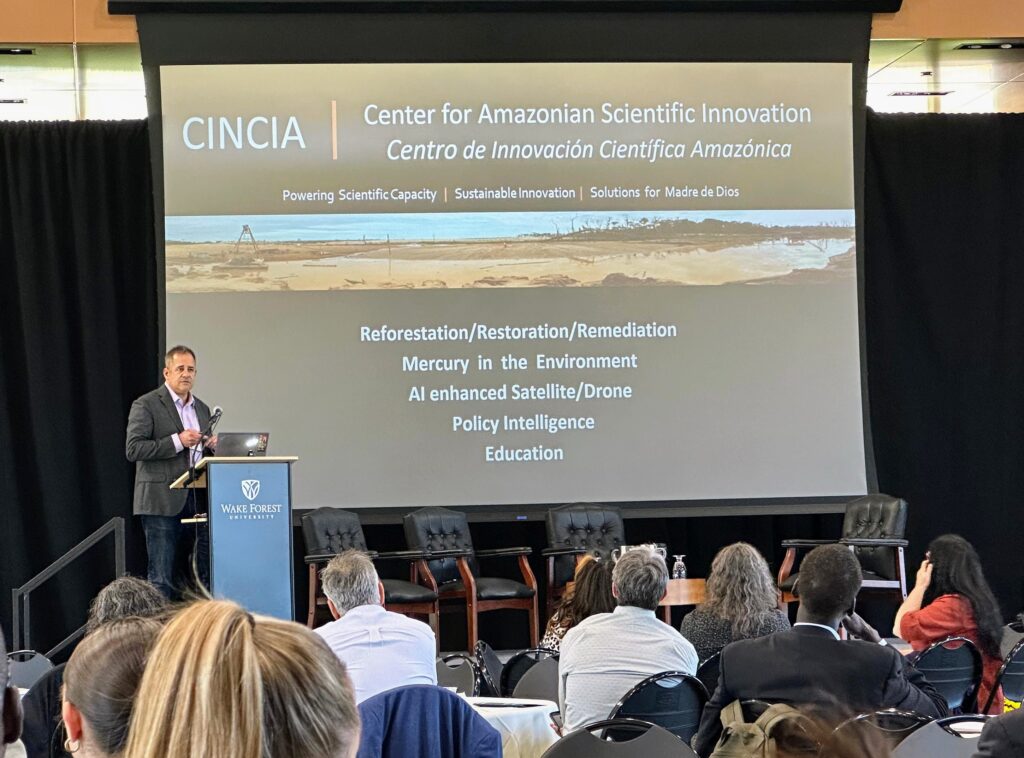
Dr. Luis Fernandez, Executive Director of the Center for Amazonian Scientific Innovation (CINCIA) at Wake Forest, also shared his experience leading restoration efforts in the Peruvian Amazon, where artisanal gold mining has caused significant environmental destruction. His work, including the use of drones and AI to monitor mercury levels and deforestation, exemplifies the innovative approaches that Wake Forest is fostering to combat global environmental challenges and showcases how Wake Forest’s partnerships are making a tangible difference on the ground through conservation, research, education, and communicating scientific knowledge.
A Vision for the Future
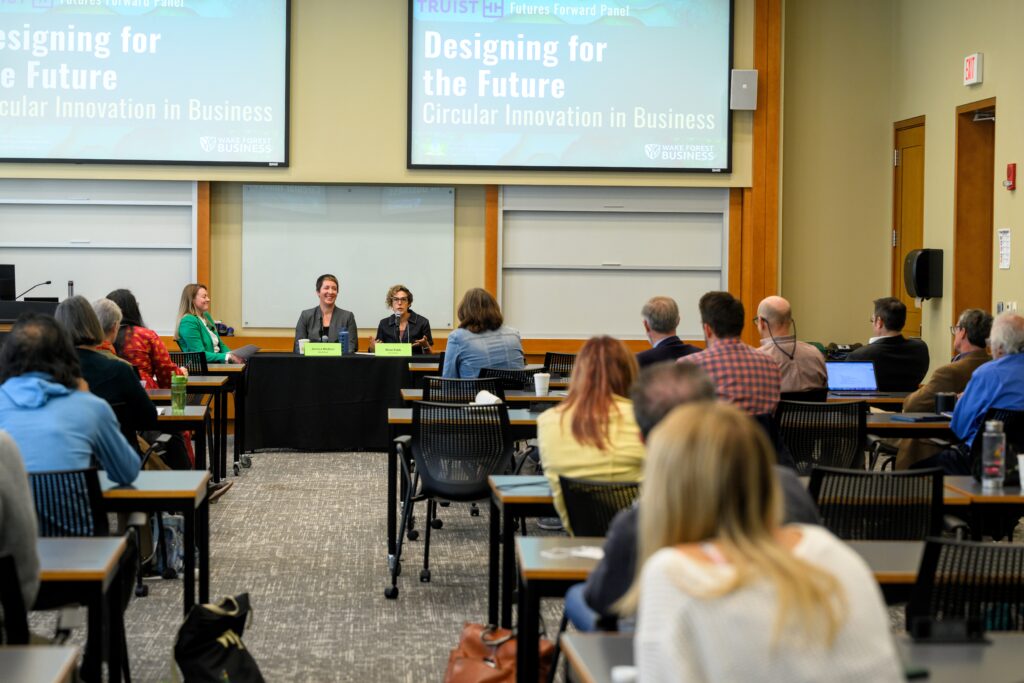
The conference closed on a forward-looking note with a session dedicated to the circular economy, part of the Truist Future Forward Challenge. This session not only explored how businesses can eliminate waste and design sustainable systems that regenerate resources rather than deplete them but also served as the official kick-off for an exciting new sustainability course for undergraduates, launching in Spring 2025. Developed in collaboration with the business school and the undergraduate environmental and sustainability program, the course will introduce students to the principles of the circular economy and explore how businesses are rethinking the use and reuse of resources.
Through this course, students will have the unique opportunity to interact with business leaders and organizations, gaining hands-on insights into how circular design can create sustainable solutions that enhance well-being and reduce environmental impacts. By equipping students with invaluable skills in sustainable business practices, Wake Forest is preparing them to lead in the world of tomorrow.
A Lasting Commitment to Environmental Leadership
As the conference concluded, attendees left with new knowledge and a sense of purpose. The conference catalyzed new connections and sparked conversations that are already paving the way for future collaborative projects. This impact underscores Wake Forest’s role as a driving force for meaningful action and innovation in environmental sustainability, setting a high bar for future gatherings and reinforcing the university’s position as a thriving international hub for environmental research and action.
Wake Forest University’s Provost Michele Gillespie captured the spirit of the event in her introduction of keynote speaker Elizabeth Kolbert, saying, “By bringing together diverse voices and perspectives on environmental stewardship, Wake Forest is positioning itself as a leader in fostering innovative solutions to global challenges. This conference not only enriches our academic community but also contributes to the broader dialogue on creating a sustainable future.”
“By bringing together diverse voices and perspectives on environmental stewardship, Wake Forest is positioning itself as a leader in fostering innovative solutions to global challenges. This conference not only enriches our academic community but also contributes to the broader dialogue on creating a sustainable future.”
Provost Michele Gillespie
Through its Andrew Sabin Family Center for Environment and Sustainability, the University is creating a prominent platform for cross-disciplinary collaboration and equipping the next generation of environmental leaders with the tools they need to confront the challenges of our time. With growing momentum and a commitment to academic excellence, research, and practical solutions, Wake Forest is well-positioned to play a pivotal role in the future of environmental stewardship—regionally, nationally, and globally. As one attendee shared, “My biggest takeaway was that Wake Forest University is poised to become a vibrant voice on stewardship issues on the regional and possibly even national stage.”
The overwhelmingly positive feedback from attendees affirmed Wake Forest’s growing reputation as a leader in environmental sustainability, with many participants expressing a renewed sense of the University’s commitment to addressing the world’s most pressing environmental challenges.
“The conference showed what the Sabin Center does best,” said Silman. “It brings together a global community of innovators, educators, and advocates to train the leaders of tomorrow and solve the essential environmental challenges of our time.”
As environmental issues become more urgent, the Sabin Center’s work in advancing stewardship and sustainability through education and action will continue to have a profound impact, offering hope for the planet’s future and inspiring all those involved to contribute to meaningful change.
